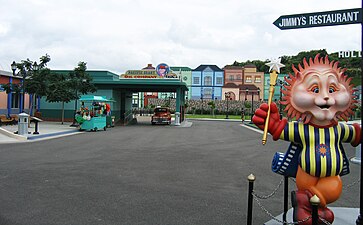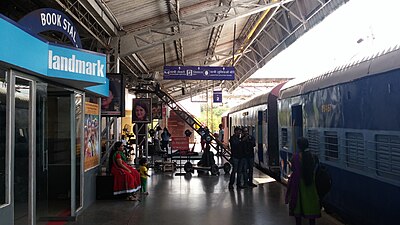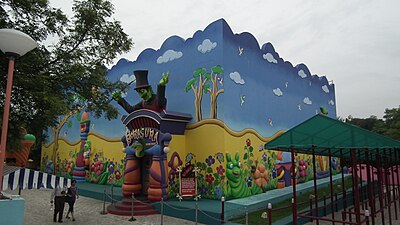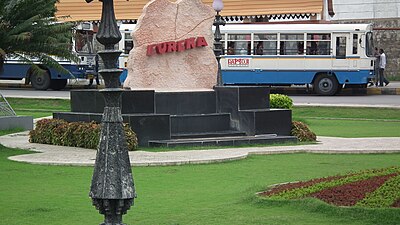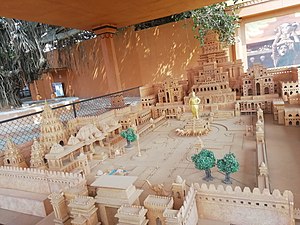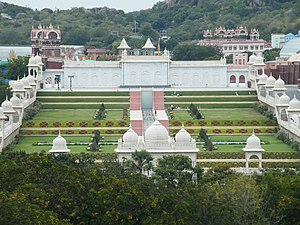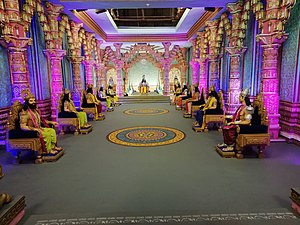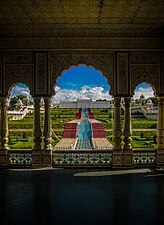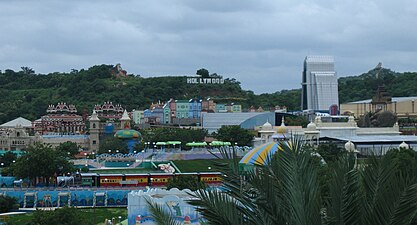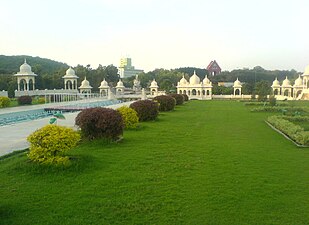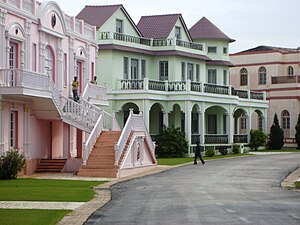Ramoji Film City
 | |
 Entrance to Ramoji Film City | |
| Company type | Privately held company |
|---|---|
| Industry | Motion pictures |
| Founded | 1996 |
| Founder | Ramoji Rao |
| Headquarters | , |
| Parent | Ramoji Group |
| Website | ramojifilmcity |
Ramoji Film City is an integrated film studio facility located in Hyderabad, India. Spread over 2,000 acres (810 ha),[1] it is recognized as the world's largest film studio complex by the Guinness World Records.[2][3] Established in 1996 by Telugu media proprietor Ramoji Rao, it has been described as a "city within a city" by The Guardian.[4]
In addition to serving as a major hub for film production, Ramoji Film City is a popular thematic holiday destination, featuring a mix of natural landscapes, artificial sets, and an amusement park. Around 1.5 million tourists visit the place every year.[5]
History
[edit]Ramoji Film City, located in Abdullapurmet on the outskirts of Hyderabad, was conceived by Ramoji Rao, a businessman, media proprietor, and film producer.[1] Drawing inspiration from the grandeur of Hollywood studios, it was envisioned as a state-of-the-art facility for film production and a thematic destination for visitors.[6]
Following the acquisition of land, Ramoji Rao commissioned art director Nitish Roy to design the complex. The site, which originally featured jungles and rugged terrain, was developed with a focus on preserving its natural environment and ecological features.[7]
The first film to be entirely shot at Ramoji Film City was Maa Nannaku Pelli (1997).[8]
Studio facilities
[edit]
The film city encompasses a wide range of sets and production facilities designed to cater to various filmmaking requirements. The site includes permanent sets such as forests, gardens, mansions, apartment blocks, hotels, a railway station, and an airport,[9] as well as 47 sound stages for indoor filming. Additional infrastructure include a central kitchen to support film crews.[3][10]
The facility is equipped with six hotels and provides internal transportation via vintage buses and air-conditioned coaches. Employing approximately 1,200 staff members and 8,000 agents, Ramoji Film City handles around 400–500 film productions annually across multiple Indian languages.[9] It can accommodate up to 15 simultaneous shoots.[9]
Tourism
[edit]Beyond its role in film production, Ramoji Film City is a major tourist destination, featuring both natural and artificial attractions.[6] Key elements include an amusement park, gardens, and film sets from notable productions such as Baahubali (2015) and Baahubali 2 (2017). Attracting nearly 1.5 million visitors annually, the facility offers a range of experiences, including tours of film sets and thematic zones. The site is designed to provide a blend of entertainment and insight into the filmmaking process.[11][5][9]
Gallery
[edit]-
A view from Ramoji Film City
-
A railway station set used in the film Chennai Express
-
Statue of Bhallaladeva from Baahubali franchise
-
Burasura at Fundustan fun area
-
Eureka fun place
-
Views from Ramoji Film City
-
Dilse Restaurant
-
Baahubali film set
-
Film sets
-
Railway station platform set
-
Film sets
-
A view from Main Fun area
-
Mock of a Rajasthan palace
-
Historical Bhagavatam set
-
Vrindavan gardens setting
-
Mughal Garden
-
Views from Ramoji Film City
-
Views from Ramoji Film City
-
Mughal Garden
-
A set of England
-
Ramoji Film City
-
Ramoji Film City
See also
[edit]- Telugu Cinema
- Film City, Mumbai
- Film and Television Institute of India
- State Institute of Film and Television
References
[edit]- ^ a b "About Us". Ramoji Film City. Retrieved 23 December 2024.
- ^ "Survey of world's biggest film facilities". The Hollywood Reporter. 30 August 2007. Retrieved 13 August 2022.
- ^ a b "Largest film studio". Guinness World Records. Retrieved 2 January 2021.
- ^ Reith-Banks, Tash (29 January 2019). "Tollywood confidential: inside the world's biggest film city". The Guardian. ISSN 0261-3077. Retrieved 25 June 2020.
- ^ a b Iyer, Pico (7 February 2012). "In India, the World's Largest Movie Studio—and Its Colorful Films". Vanity Fair. Retrieved 13 August 2022.
- ^ a b Nathan, Archana (6 February 2018). "At Ramoji Film City in Hyderabad, everything is about show business (and not just for filmmakers)". Scroll. Retrieved 1 May 2018.
- ^ Reddem, Appaji (4 March 2022). "Is Telugu cinema set for a change of scene Hyderabad to Visakhapatnam?". The Hindu. ISSN 0971-751X. Retrieved 12 September 2022.
Ramoji Film City, which was built in Hyderabad in 1996 ....
- ^ Dasagrandhi, Madhuri (8 July 2018). "Where the magic gets unfolded". Telangana Today. Archived from the original on 2 November 2019. Retrieved 3 December 2022.
- ^ a b c d Reddem, Appaji (4 March 2022). "Is Telugu cinema set for a change of scene?". The Hindu. ISSN 0971-751X. Retrieved 12 September 2022.
- ^ "Ramoji Film City sets record". Business Line. 3 August 2005. Archived from the original on 13 December 2012. Retrieved 10 January 2012.
- ^ "Ramoji Film City may lose land to ORR - Hyderabad - City". The Times of India. 6 July 2006. Archived from the original on 11 August 2011. Retrieved 6 September 2010.
External links
[edit]- Culture of Hyderabad, India
- Indian film studios
- Film production companies based in Hyderabad, India
- Tourist attractions in Hyderabad, India
- Amusement parks in Hyderabad, India
- Amusement parks opened in 1996
- Indian companies established in 1996
- Mass media companies established in 1996
- Ramoji Group
- 1996 establishments in Andhra Pradesh
- 20th-century architecture in India

